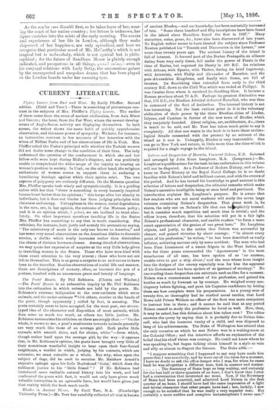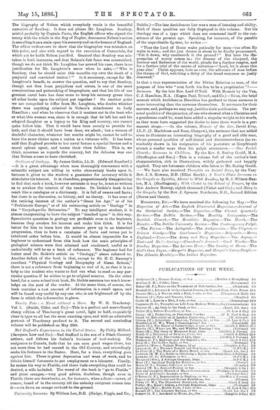Letters and Despatches of Horatio, Viscownt Nelson, K.S. Selected and
arranged by John Knox Laughton, M.A. (Longmans.)—Mr. Laughton's qualifications for the task he has undertaken in this volume will not be disputed. As a Professor of Modern History, and as Lec- turer on Naval History at the Royal Naval College, he is no doubt familiar with Nelson's brief and brilliant career, and with the events of the period. And he has turned his knowledge to good account in this selection of letters and despatches, the editorial remarks which make Nelson's narrative intelligible being at once brief and pertinent. The introduction explains Mr. Langhton's purpose. He is aware that *few readers who are not naval students will study the seven large volumes containing Nelson's despatches. That Feat work is, he states, the only one on Nelson's life that can befrplicitly trusted, but it contains much repetition and much that is trivial ; and the editor hopes, therefore, that his selection will put in a fair light Nelson's professional character, and enable readers "to form a more exact appreciation of the genius of our great hero." Mr. Laughton objects, and justly, to the notion that Nelson was successful by chance, and gained victories by sheer courage. " In almost every point of his profession," he writes, " he has been described as really inferior, achieving success only by some accident. The man who had been First Lieutenant of a smart frigate in the West Indies, and who for three years commanded the ' Agamemnon ' in the most treacherous of all seas, has been spoken of as ' no seaman, unable even to put a ship about ;' and the man whose keen insight into the designs of the enemy especially won for him the approval of his Government has been spoken of as ignorant of strategy." No one reading these despatches can entertain such an idea for a moment. Nelson was a consummate master of his profession, and gained his battles as much by forecast as by courage. He weighed every con- tingency before fighting, and gave his Captains confidence by letting them see bow complete were his preparations. As a young man of twenty-five, so thoroughly had he studied naval tactics, that Lord Howe told Prince William no officer of the fleet was more competent to instruct him in them; and it cannot be said that at any period Nelson ceased to study the profession he loved so well. How, then, it may be asked, has this delusion about him taken root ? The editor answers the query by saying that it is probably due to Nelson him- self, who had the innocent vanity of a child, and was disposed to brag of his achievements. The Duke of Wellington has related that the only occasion on which he met Nelson was in a waiting-room at the Colonial Office ; and the interview affords an explanation of the belief that his chief virtue was courage. He could not know whom he was speaking to, but began talking about himself in a style so vain and silly as almost to disgust the listener. The Duke adds :—
" I suppose something that I happened to say may have made him guess that I was somebody, and he went out of the room for a moment, I have no doubt to ask the office-keeper who I was, for when he came back he was altogether a different man, both in manner and matter. The Secretary of State kept us long waiting, and certainly for the last half or three-quarters of an hour, I don't know that I ever had a conversation that interested me more. Now, if the Secretary of State had been punctual, and admitted Lord Nelson in the first quarter of an hoar, I should have had the same impression of a light and trivial character that other people have had ; bat, luckily, -I saw enough to be satisfied that be was really a very superior man. But certainly a more sudden and complete metamorphosis I never saw."
The biography of Nelson which everybody reads is the beautiful narrative of Southey. It does not please Mr. Laughton. Southey, misled probably by Captain Foote, the English officer who signed the treaty with the rebels in the Bay of Naples, denounces Nelson's action in annulling ibos a stain upon hiamamoryand on the honour of England. The editor endeavours to show that the biographer was mistaken on this point, and also with regard to the execution of Caracciolo, for which act he holds Nelson justified. Granted that Southey was mis- taken in both instances, and that Nelson's fair fame was untarnished, though we do not think Mr. Laughton has proved his case, there is no justification for Mr. Laughton's sneer when he asks, —" Who is Southey, that he should raise this -maudlin cry over the death of a perjured and convicted traitor ? " Is it necessary, except for Mr. Laughton's benefit, to answer the question, and to say that Southey, though not free from prejudices and errors, is one of the moat conscientious and painstaking of biographers, and that his life of our greatest naval hero has done more to keep his memory green than all other books upon the subject pat together ? On another point we are compelled to differ from Mr. Laughton, who doubts whether there was anything criminal in Nelson's attachment to Lady Hamilton ; and when be observes that it matters not in the least who or what this woman was, since it is enough that he left her and his adopted daughter as a legacy to his King and country, one cannot quite follow him. That it would have been seemly to provide for both, and that it should have been done, we admit ; but a woman of doabtfnl character, whatever her merits might be, cannot be said to have the same claims upon a nation as a virtuous wife. It has been said that England permits to her naval heroes a special license and a moral sphere apart, and terms their vices foibles. This is, we think, nonsense as regards the country, but the delusion was one that Nelson seems to have cherished.



































 Previous page
Previous page